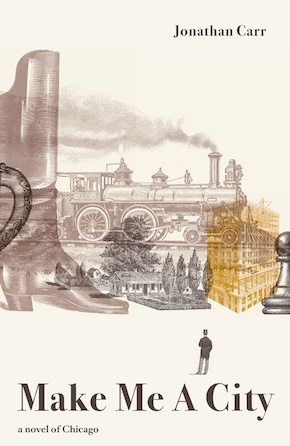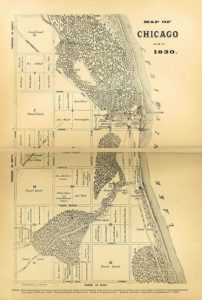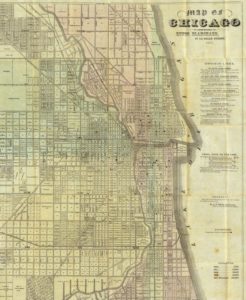Next year will be even better
by Jonathan Carr
“A notably rich, rewarding read.” Daily Mail
John was troubled by the fact that he could remember neither the precise day nor the particular circumstances under which he first set eyes upon her wispish, bustling figure. It did not matter how busy he had been. That encounter should have struck him with the force of a blinding light. He ought to have been able to remember every word they exchanged as accurately as he could recite passages from Homer or list the Elements of Euclid. But he was unable to do so. He knew only that they must have met for the first time in the old store, sometime in May or June. Probably, she had been looking for ink and paper. That was what she usually bought. She wrote a lot of letters, she told him. And how often did Miss Eliza Chappell come back over the next few weeks? Eight, ten, twelve times?
That second summer in Chicago was the finest of his life, to which the arrival of Miss Chappell added the most thrilling element. John had never been happier. There was something magically unstoppable about the way things were changing, as though nature itself might have been behind the frantic mix of hastily constructed houses, the stores and warehouses that he watched rise higgledy-piggledy out of the virgin swamp to the grind of saws and the thump of hammers in clouds of sawdust, the air reeking with the scent of fresh-cut timber and filled with oaths in half-a-dozen different tongues from morn to dusk. And maybe nature was in collusion too with the plumes of blue-grey smoke, with the glow of lamps and candles reflected off the waters of the Lake by night, just as it was responsible for the earth’s invigorating perfume after a summer squall, for the release of the rich odour trapped in the clayey depths of its old soil.
John, whenever he wasn’t working, would briskly walk the growing grid of dirt tracks, dotted here and there with shacks and frame houses, that stretched and criss-crossed the flat, empty land in the four directions of the compass. He would count the new houses going up and answer questions from newcomers like the old-timer – at just eighteen years of age – he had already become. Always, he was on the lookout for lots worth bidding for. He imagined a future in which Chicago was five, ten, even fifteen times bigger.
Chicago was as young and ambitious as John Stephen Wright. Together, they would forge a glorious future for themselves.”
Every day, supplies were coming in. Every day, more wagons were pitched on empty lots. Everywhere you looked, there were horses grazing. At least once a week, a ship would anchor offshore in the Lake, unloading people and goods. Prairie schooners kicked up funnels of dust as they skirted the line of sandhills and clipped into town, bearing another complement of young Yankee settlers or immigrants from the Old World or sometimes a whole family, the final stage from Detroit now completed after travelling for weeks over rutted tracks from far-off New Hampshire or New England in search of a new life. Like him, they believed that this was no false dawn for the West. Chicago was as young and ambitious as John Stephen Wright. Together, they would forge a glorious future for themselves.
He and his father built a new store that summer, providing a fine opportunity to discourse with Miss Chappell on one of his favourite topics – frame houses. They had been invented by Mr Snow only two years before, he told her, when he built a warehouse with nothing but a bag of nails and a pile of two-by-fours. And now they were everywhere. What would Chicago be without them? He wasn’t claiming they were pretty – the Kinzie family’s old log mansion was the finest building in town – but they were practical. Think of the lumber that was saved. There was no need for a skilled carpenter. Anyone could put up a frame house as long as they had the proper lengths of scantling and sidings, ordered in the right proportion.
‘And a plentiful supply of nails, Mr Wright?’ he remembered her suggesting. ‘Perhaps…’ (and at this point she read from the sign on the counter) ‘… perhaps cut nails from 3p. to 20p. of superior quality by the keg?’
John laughed. ‘Scantling, sidings and nails will hold this town together. You’ll see, Miss Chappell. Believe me.’
‘Chicago is a town already?’
He pointed to the sign propped up on the counter: Next year will be even better. ‘It shall be soon, Miss Chappell. And a big one.’
‘Then perhaps I should address you as Mr Prophet, not Mr Wright?’
He liked that. ‘Now, if you are ready to start building at once, I can offer you an excellent price on nails, if only you would buy three kegs at once?’
She smiled, in a tight-lipped way. ‘Perhaps I should alter the spelling? P-r-o-f-i-t?’
***
On another occasion she said, to his delight: ‘Conversation with you is like gazing up at the aurora borealis, alive with shooting stars. You never know where the next bright idea will come from.’ He would never forget her saying that.
But the truth was that the more they talked, the less certain of himself he began to feel. Ideas were one thing, points of view another. Miss Chappell already seemed to know what she believed in. One day, he had been telling her about a corner lot he had bought for $12,000 on Water Street for a down payment of just $300. The location was excellent. He had no doubt it would be worth three times that amount within a year.
‘Tell me Mr Wright,’ asked Miss Chappell, ‘how does this property speculation profit humankind? Does it educate our children? Does it grow food? Does it improve our health? Does it strengthen our faith? Does it develop civilisation? Does it assist us in ridding this country of the abomination of slavery? Does your property speculation heighten our love for Almighty God?’
For all his learning and quick wit, John floundered in his response to this battery of questions. He stood behind the counter and fiddled with a box of nails. His mind was racing. The problem was that the questions she posed were the same ones that, in moments of quiet reflection, troubled his own soul. What good was he doing in the world, with all this activity, with all this buying and selling, with his frantic purchasing of new lots? What did he really think, in his heart, about the rights and wrongs of slavery? Was it enough to argue that anti-slavery agitation was a matter of high-up political maneuvering that did not concern him? Was it enough to say, each to his own? Was it enough to pledge never to employ a slave himself, while at the same time refusing to cast judgment on those that did?
‘It is a question of morality, Mr Wright. I suggest we all need to take a moral stand.’
He admired her for saying that. He understood she meant more than simply following the teachings of our Lord. All he could do was nod his head and agree. She raised a small, gloved hand and smiled. ‘I’m sure not all speculation is bad,’ she said. ‘In fact, I wondered if I might ask you to speculate on my behalf?’
John looked at her in surprise.
‘I am, as you know, a teacher without a school. Might you be able to speculate as to where a Normal school might be established in Chicago, so that the child of the humblest cottage and the finest palace can meet on equal terms? And might you also, perhaps, speculate as to how that school might be equipped with furniture by the beginning of September?’
He often had the uncomfortable sensation that he was not sure what he was doing or what he was meant to do. He knew only that the day felt empty when it passed without sight or sound of Miss Chappell.”
And with another smile, tight-lipped but so infectious that John found himself smiling back, the slight Miss Chappell swung around on her heels as neatly as a dancer on the turn, opened the door and stepped lightly across the boards at the entrance in the direction of Dearborn Street, where he heard she had taken lodgings.
He watched her until she was out of sight.
Shortly afterwards, he closed the shop and went to visit his friend Mark Beaubien. This fall, when they moved into the new store, the room they were currently renting from Mark would become vacant. It would be big enough for a schoolroom. If Mark agreed, he would be happy to pay the rent for it out of his own savings. And then who knows? Maybe next year he would build Miss Chappell a school of her own. How grateful and indebted to him she would feel, though he would make nothing of it. His mother would also be delighted to hear he was building a Normal school. The matter of education for all was dear to her heart and it would give him enormous pleasure to break the news to her. How proud of him dear Mater would be.
John’s upbringing had been strict, one in which innermost feelings were not discussed. His communications with women, in particular young women, had been limited. In the presence of Miss Chappell, he often had the uncomfortable sensation that he was not sure what he was doing or what he was meant to do. He knew only that the day felt empty when it passed without sight or sound of Miss Chappell.
Perhaps his inability to recall anything about their initial encounter was because he did not, in the beginning, find her mightily attractive. His first impressions had been of a slight, feathery creature. Everything about her looked fragile and petite. And yet he came to realise that this appearance of physical frailty was deceptive. She showed stamina. She was energetic. He had never met anyone who was as full of ideas, nor anyone who was as confident, intelligent and forceful. She was also, he discovered, remarkably brave. On one occasion, he expressed his surprise that she had lost some teeth so early in life. He had become accustomed to the quirks of her diction – the breathy sounds that substituted for the harder sounds a full set of teeth would have given her. In fact, he found her voice charming, and that made it even more difficult to argue against her.
‘I have lost all my teeth, Mr Wright,’ she corrected him. ‘It is as well that I am partial to porridge, batter cakes and apple dumplings.’
The rot began with prolonged salivation by calomel, she explained, which had been prescribed for other maladies. The surgeons that came afterwards could find nothing good in any of her teeth, so they had been extracted, one by one, over a number of years. A majority had been removed shortly before she came to Chicago, which had affected her speech. And her diet was much changed, too. She mentioned this terrible misfortune as if it were the most natural thing in the world.
He reminded himself that there was nothing in the world he could not do if he applied himself, and that included conducting a conversation on his own with Miss Chappell.”
He looked at her directly, where she stood upright and diminutive, across the counter. Her eyes were green and turned his way. They were flooded, it seemed, with sunlight.
‘I think of it this way, Mr Wright,’ she said. ‘I shall never again suffer from toothache. Is that not a most particular blessing?’ She grinned, in her tight-lipped way.
He grinned back. And as he did so, something stirred in his heart. For the first time, perhaps, he was seeing her properly. He had never gazed at a young woman like that before. It was not done. And yet it was being done, and done without embarrassment. How could he have failed to recognise her beauty? It struck him now, with the force of an epiphany, how happy he felt in her presence, and how much he desired more of it. Their eyes were engaged in a conversation that went beyond any words they had exchanged. He did not intend to be the first to look away.
But they were interrupted. A customer came in and asked for rope. Or maybe for timber or nails, or a hammer or a hoe. Whatever it was he asked for had long since vanished from his mind. The look they shared, though, had not. That, he decided, would be his first memory of her, even though it could not have been.
‘I am twenty-eight years old.’
‘Impossible,’ he said. ‘The registrar’s pen must have slipped.’
‘You flatter me, Mr Wright, and I shall not object. And you are, I am guessing, at least nineteen?’
‘I will be next year,’ he said. He busied himself with re-arranging those boxes of nails again, which did not need re-arranging.
‘I thought you should know that about me,’ she said. ‘So there is no misunderstanding.’
Misunderstanding, exactly, about what? He wanted to tell her that age should not matter where feelings were concerned. ‘I believe my mother must have been about that same age,’ he said, ‘before she wed.’
She raised one fine eyebrow.
‘What I mean is…’ But he did not know what he really meant.
He reminded himself that he was John S. Wright, already a notable merchant and storekeeper in Chicago, and the owner of over three hundred and fifty acres of real estate. He reminded himself that there was nothing in the world he could not do if he applied himself, and that included conducting a conversation on his own with Miss Chappell.
‘I’m sure you must miss your mother, Mr Wright?’
He agreed he did. ‘She will be moving to Chicago,’ he said, ‘in the spring.’
She was pleased to hear that. ‘Sometimes we don’t realise how much we miss those we love,’ she said, ‘until we are driven apart from them.’
This was another of those things he would remember her saying.
from Make Me a City (Scribe, £16.99)
 Jonathan Carr has worked as a travel correspondent, a book reviewer and a teacher of English. In between periods spent living in the UK, Kenya, Gambia, Greece and Louisiana, he first visited Chicago in 1983. He currently lives in Bologna. A graduate of Cambridge University, he holds a PhD from Bath Spa University in Creative Writing. Make Me a City, his first novel, is an epic chronicle of Chicago’s first hundred years, published in hardback and eBook by Scribe.
Jonathan Carr has worked as a travel correspondent, a book reviewer and a teacher of English. In between periods spent living in the UK, Kenya, Gambia, Greece and Louisiana, he first visited Chicago in 1983. He currently lives in Bologna. A graduate of Cambridge University, he holds a PhD from Bath Spa University in Creative Writing. Make Me a City, his first novel, is an epic chronicle of Chicago’s first hundred years, published in hardback and eBook by Scribe.
Read more
jonathancarr.me
@JHGCarr
Author portrait © Zute Lightfoot



